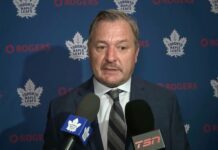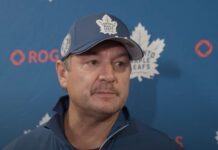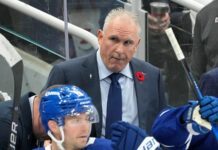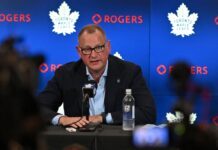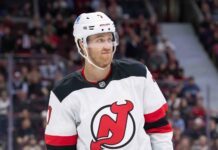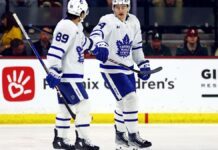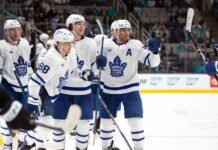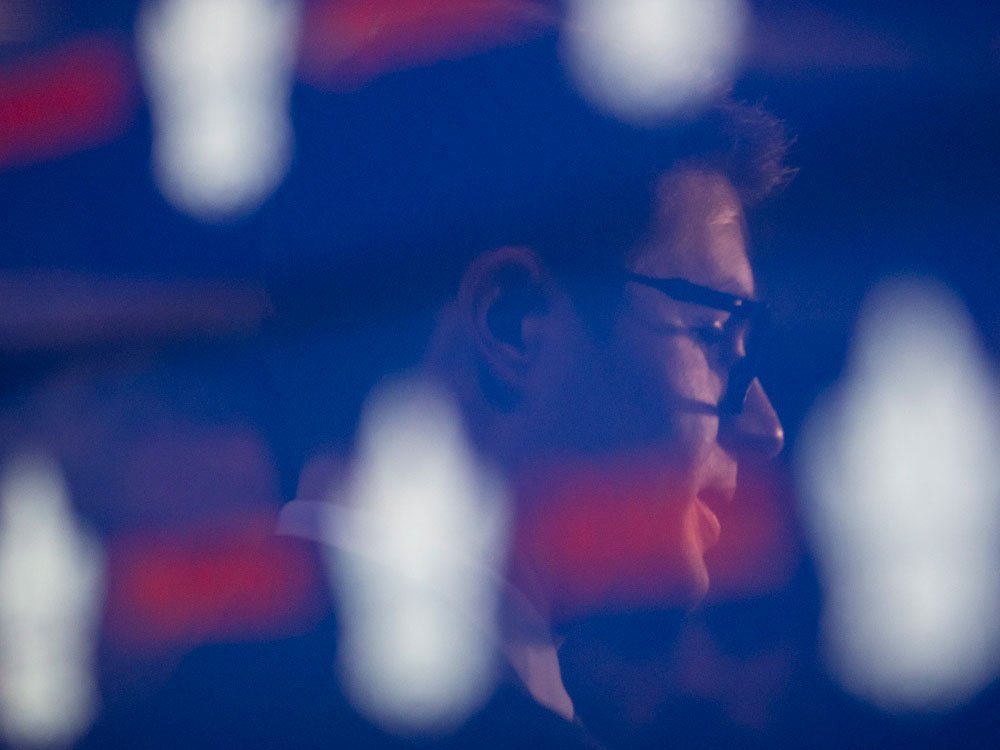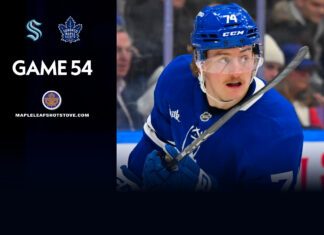GM Kyle Dubas joined TSN Overdrive to discuss the difficulty of potentially losing Zach Hyman, the viability of the team’s top-heavy cap structure, its search for a goaltender this offseason, and the status of John Tavares coming off of his injury in the playoffs.
tl;dr:
- There is still some hope remaining for re-signing Zach Hyman, but Dubas emphasizes there is a limit to what the Leafs can do within their cap constraints.
- The expansion draft was a case of “hedging risk,” minimizing damage to the roster, and avoiding the perceived strong likelihood of losing Justin Holl to Seattle if he was exposed.
- Dubas admits the Leafs’ cap structure of paying four forwards half of the team’s cap space has never been done, and it wasn’t the team’s original plan before the unforeseen flattening of the salary cap’s upper limit, but they’re forging ahead with an abiding belief in the core.
- The team’s depth needs to be better, and the Leafs‘ GM is taking responsibility for past shortcomings there.
- Dubas calls a goaltending addition, via FA or trade, a major priority knowing that it doesn’t matter what they do with the rest of the roster if they aren’t adequately shored up in this area.
- Ilya Mikheyev is explicitly mentioned by Dubas as a player who could be in for more opportunity next season.
How difficult is it to balance the emotional attachment to a player like Zach Hyman — a guy who means so much to your lineup — against the fact that he is in his late 20s, he has an injury history, he plays a physical brand of hockey, and will also demand a long-term deal?
Dubas: In these situations, you try to evaluate if you want the player back. In this case, we would unequivocally say yes. It’s then a matter of going through the AAV that is going to be required to do so, analyzing whether that fits for us and works for us, and then going through and looking at the term and the long-term risk. There are a number of factors, especially with the cap being flat, that come into play, for better or worse.
That is where we are at now. We have some hope still, but these are unfortunately the most difficult parts of this. You have a player that has given a lot to the organization and has been a great person away from the work and the community. At some point, you just have to make these calls. That is where we are at now.
There are reports he has talked to Edmonton and could have the framework of an offer. Will you go back to the Hyman camp between now and next Wednesday?
Dubas: I have not had a discussion with Todd Reynolds today. We will see where that goes to. Todd had kind of told me what other teams were hinting at in terms of what they may do, which was beyond what we had thought we would be willing or able to do given our constraints with the salary cap and so on.
Last Monday, nine days ago now, we gave Todd permission to begin engaging with other groups. I talked to Todd later in the week, and Zach as well. We will see where that goes. We try to get ahead of it a little bit and really ensure that what they thought was going to be out there was out there.
We will see where it all lands here in the next week. We will continue to have discussions if they’re warranted and proceed from there.
The quote that got a lot of attention today was about you believing in this team, that it will win, and you would bet everything on that. Why do you have so much confidence in a group that still hasn’t had any success in the playoffs?
Dubas: I don’t expect others to look at it and feel the same way. Fans of the team have lived the disappointment for far longer than I have been a member of the group and we have been a management group here. I know all of that stuff has a long-term impact on the way that people respond to further disappointment as it goes along.
I don’t think anything we say or do today will make anyone feel better about the fact that we fell short of expectations this year. I think we fell short of the hope that we gave people with the way that we performed in the regular season. I think that is part of the way people feel the way that they do now — not to mention the previous years or decades in some cases of the team never getting to the level the fans want it to get to.
As for why I believe in the group, I know who they are as people. I see the work they put in. I know their talent level. I think it is much better to go through life believing in people or something, even and especially in the face of major doubt or when it has failed and needs to pick itself up. That is just how I feel about the group.
I would rather believe and be wrong than doubt, shift course, begin to change the way we have done it, and then look back and regret that. I see our players every day in our facility. I see the work that they put in and the direction and criticism that they are willing to take in order to get better — especially of late. I know it hasn’t manifested itself in success in the playoffs, but I think if we continue to remain steadfast and stick with our convictions, the belief will be rewarded.
There is a school of thought that when you have four forwards making up half of your cap, it is too hard to win. How do you respond to that?
Dubas: The criticism is fair. I don’t know the exact number off of the top of my head. I think Pittsburgh, between 2007-2010, had a similar breakdown. I don’t think it was all forwards, but they had a similar sort of cap concentration among the top three or four guys at that time on their club. I understand the reason why folks would look at that and say that they don’t think we can win with that cap construction. It has not been done.
The reality is that it wasn’t the plan from the outset. When we looked at it, prior to the pandemic, the cap was going to continue to rise. We would have our core guys locked up for between five and seven years, and the percentage of cap would change as it went on. Unfortunately, the pandemic happened. It affected people outside of athletics and professional sports far more than it has impacted us. But we have to adapt to it.
By moving out the players that we really like, I don’t think we would find better players than them. It falls on me and our management team to find the pieces around the group that can contribute to having it break through.
I understand why people doubt it. I don’t try to fight and the doubt and the criticism of it. I think it is up to us to show we can do it. Until then, I think people having their doubts about it are completely fair. It is on us to show that we can earn that belief from outside of our facility, whether it is fans, the media, others in the league — whomever that may be. I don’t begrudge that or try to come at that at all. It is up to us to show that it can work.
Is losing Jared McCann to Seattle how you envisioned the day playing out at the expansion draft? Is it the way you hoped it would play out?
Dubas: We didn’t really have any hope in terms of who we would lose or not. The way we looked at it was that we wanted to get through the expansion draft from our roster or without having a big-time effect on the roster or needing to go out into free agency and replace the player.
From the trade deadline on, we tried to acquire as much information as we could about who Seattle may be looking at and who they may be favouring. As we went through it, the determination was that if we were to go with 7-3-1, they would certainly select a defenseman, and that defenseman would likely be Justin Holl — or the market for Holl would be so great elsewhere that they could take him and flip him.
Our decision was, and the way we went through it, was, “Could we leave Holl exposed and expect him to go unselected? If he were selected, could we replace him and what he brings at the cap hit that he plays for?” Our determination was that we could not.
We went through the rest of our process and tried to determine who they would likely take if we went 4-4-1. Could we replace that player? What is the best way to go about that in free agency? Eventually, the opportunity came along to add another player via trade who we knew may be of interest and then really force Seattle to pick between one of our two players.
If we got out from expansion having given up a really late pick and a prospect, that would be a good outcome for us. If Seattle were to take another forward, we would have McCann as a replacement and then be able to proceed from there.
It is just hedging the risk for us a little bit and trying to get through it without giving up as much as other teams or finding a way to get through it as unscathed as possible. We were going to lose something to expansion regardless.
Jack Campbell hasn’t started more than 31 games in the NHL before, and that was a few years ago in LA. Is it reasonable to expect he can play 50+? Where does getting another goaltender rank on your list of priorities?
Dubas: It is a big priority. We have a lot of belief in Jack for sure. He would’ve surpassed that number easily if it had been a full season this year but still not up in the range you mentioned there at 50 games.
For us, we can talk about all of the other parts of our roster all we want, but if we don’t properly supplement our goaltending and provide a partner for Jack who can challenge him and support each other, I think we will be putting ourselves in a tougher position. Really, that, for us, is the key as we head into next week. If next week there isn’t a market there, then we will look into trades throughout the summer and heading into the season.
We have built up a little bit of depth in our minor-league system. We have four guys already signed there between Michael Hutchinson, Erik Kallgren, Joe Woll, and Ian Scott. One of our key focuses will be on finding a really good partner for Jack here knowing that we have the depth part taken care of.
Our hope is that Jack continues to develop, evolve, and shows that the way he played throughout the season and into the playoffs, he is able to do that all throughout the season and that we have found a long-term solution there. If not, we have a solid partner for him for sure that can challenge for that same spot in the goaltending depth chart.
Is Frederik Andersen still a part of that equation?
Dubas: The door is definitely not closed on Fred.
You have about $9.5 million in cap space. You have 10 forwards, six defensemen, and a goalie under contract. If it is either Hyman or a Hyman replacement and a goalie, you don’t have a lot of space, right?
Dubas: I think that is probably fair. You are alluding to basically one more spot on the forward group. I think we will also look to increase our depth on defense and really look at depth players, which are sort of interchangeable in terms of the cap as long as they are below a certain threshold, in order to improve our depth up front as well. I think you will see a lot of those moves from us.
The key focus is what you alluded to up front and in goal. We view it as having a little bit more flexibility than that. Between guys who were here last year or various free agents, as we have gone through this process, we have a pretty extensive list of guys that we feel for lower dollars can come in and really challenge on the forward front. We can have a little bit more flexibility at the top of our forward lineup as well.
We have guys we want to see given an opportunity next season as well to do more, whether it is an Ilya Mikheyev, a Nick Robertson, a Pierre Engvall — all of those different types of things. We know we can move Kerfoot over to the wing as well and have that option. We can look for more of a bottom-of-the-lineup center to supplement him. We have that flexibility.
This is more flexibility, certainly, than we had last year in free agency. We have to check off our priorities and then be able to really excel in the depth areas. And it is on me. We haven’t done that as well in the past, speaking more of last year and this year. We have to do a better job there.
Losing John Tavares so early in the series against Montreal was a big blow to the lineup. Thankfully, he is doing okay. The nature of the offseason is that we don’t get a lot of updates. How is John doing? What is the forecast for him as you get a little bit closer to training camp in the fall?
Dubas: John has been fully cleared to return to all on-ice activity. There will still be the fact that he won’t have been in contact situations and such until we get back to training camp, maybe, and in some of those informal skates before, he may be able to replicate a little bit of that.
With an injury of that nature, you are always very cautious about a way that a player returns. In this case, with there being a lot of time elapsing between the injury in late May and training camp opening in mid-September, I think that is a good thing for us and certainly for John.
It is the type of injury we certainly can’t take lightly. We have to do right by John. We certainly will. All indications are that he will be good to go. It will just be a matter of him getting back into his rhythm as best he can and us supporting him in that regard.



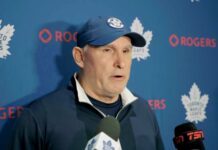
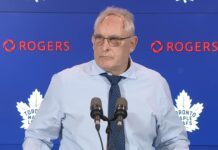
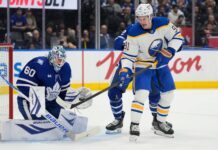

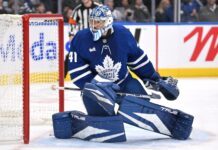
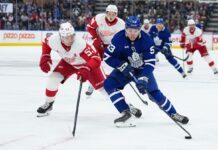
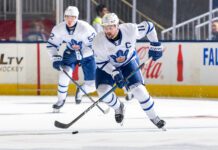
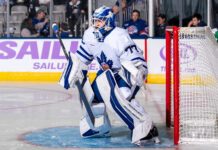
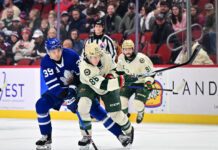
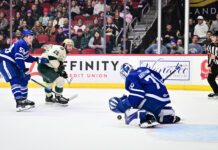
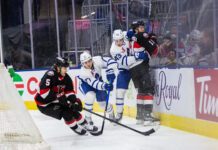
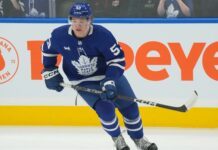
![John Gruden after the Leafs prospects’ 4-1 win over Montreal: “[Vyacheslav Peksa] looked really comfortable in the net… We wouldn’t have won without him” John Gruden, head coach of the Toronto Marlies](https://mapleleafshotstove.com/wp-content/uploads/2025/09/gruden-post-game-sep-14-218x150.jpg)
